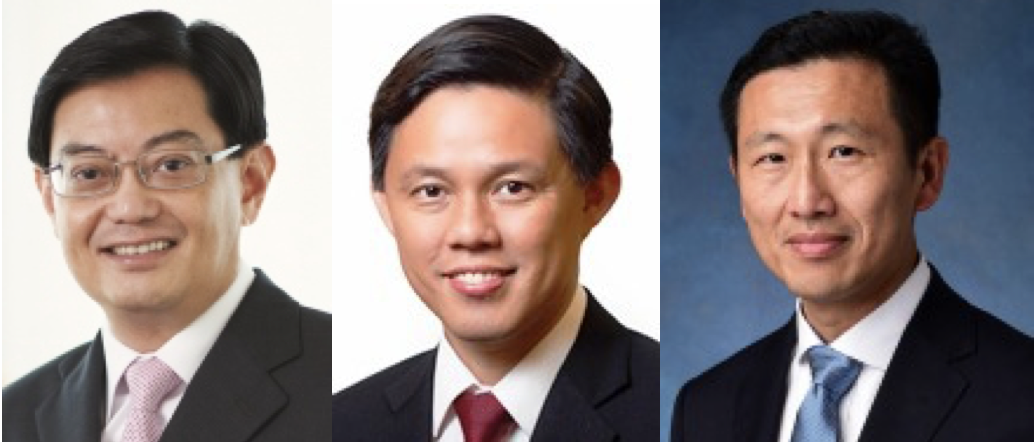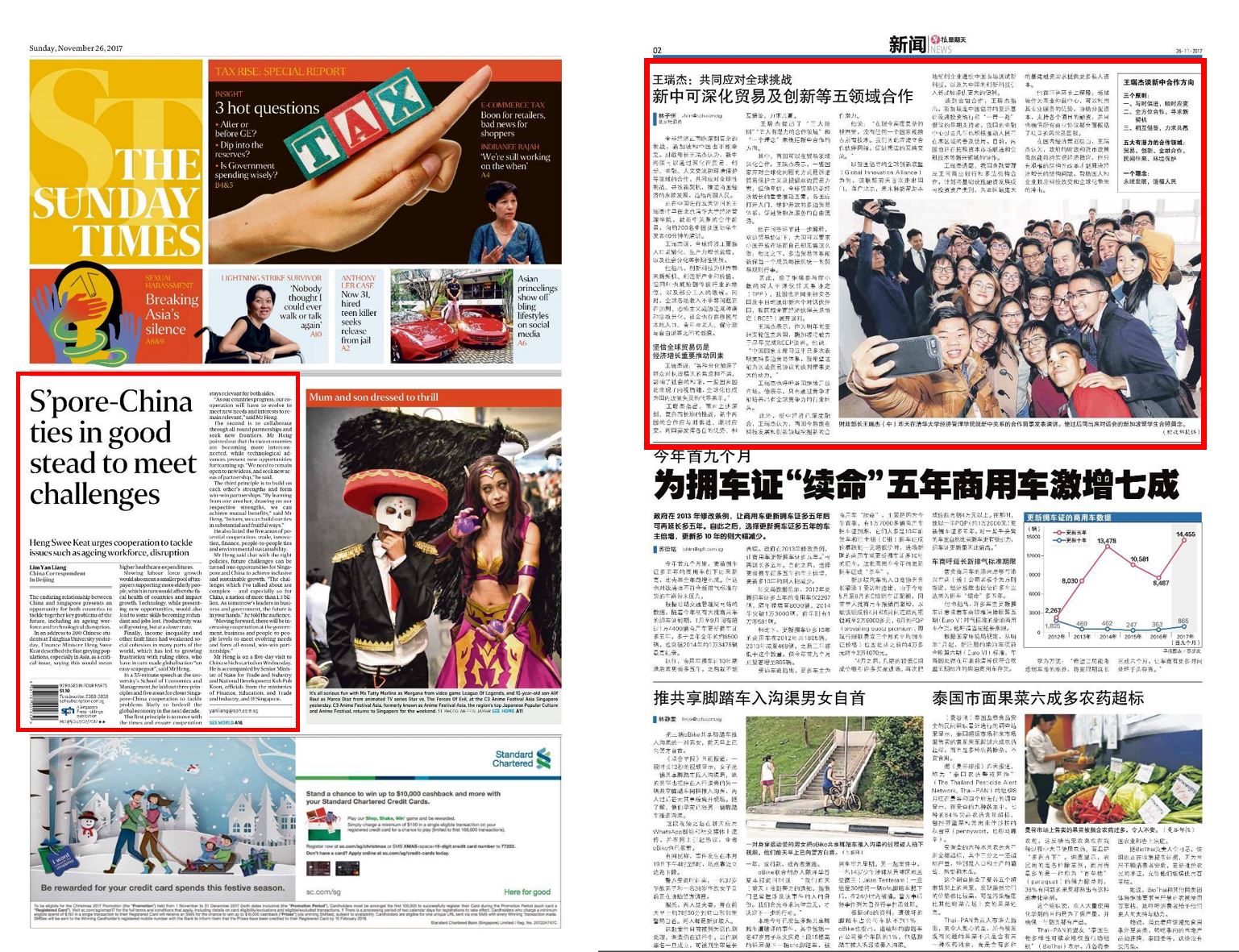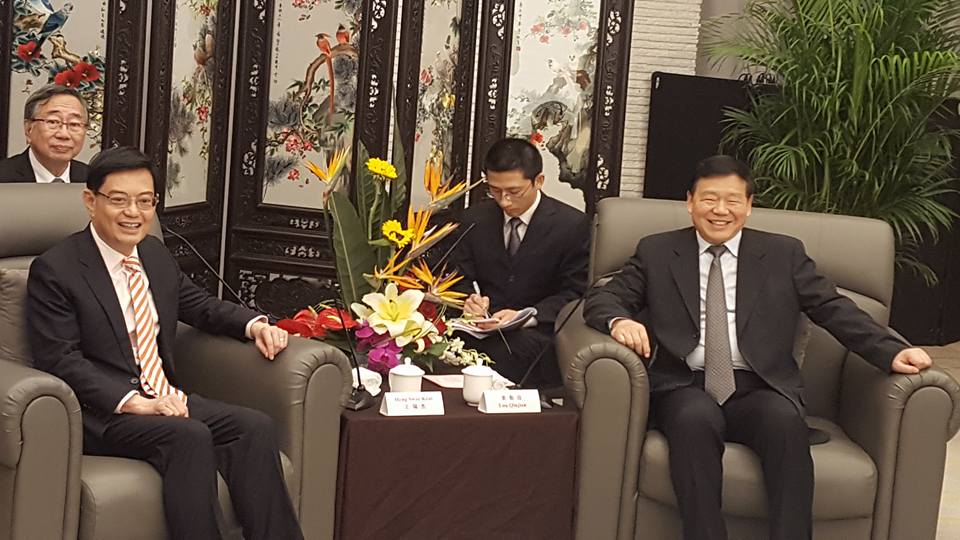Minister for Finance Heng Swee Keat was in China last week visiting Suzhou and Beijing in China for a series of meetings and engagements.
He delivered a speech titled "Singapore-China Relationship: Enduring Ties, New Partnerships for a Better Future" in Beijing at the Tsinghua University School of Economics and Management on Saturday (Nov. 25).
Heng's way forward for S'pore-China relations
Speaking in a style that would not sound out of place in a Chinese state media report, but will nevertheless resonate with his Chinese audience, Heng organised his ideas with neat verbal sign postings and slogans in the 77-paragraph speech.
He basically pointed the way forward for Singapore-China relations in line with three principles, five potential areas, and one vision.
He even provided Chinese translations for the main concepts he articulated, reflecting not only his meticulousness, but also his desire to be understood accurately. (It's one of our most important bilateral relationships after all, no one wants to get lost in translation or screw up on this.)
Here's a rundown of the main points he made.
Three principles (三大原则)
1. To move with the times and stay relevant (与时俱进, 顺时应变)
"The challenges we face are getting more complex. As our countries progress, our cooperation will have to evolve to meet new needs and interests to remain relevant."
2. To collaborate through all-round partnerships and seek new frontiers (全方位合作, 寻求新契机):
"Our economies are increasingly interconnected. There are new opportunities with technological advances and innovation. We need to remain open to new ideas, and seek new areas of partnerships."
3. To build on each other’s strengths, and form win-win partnerships (相互借鉴, 力求共赢):
"By learning from one another, drawing on our respective strengths, we can achieve mutual benefits. In turn, we can build our ties in substantial and fruitful ways."
[related_story]
Five potential areas (五大有潜力的合作领域)
1. Trade
"Indeed, we need to open our doors and maintain an open, multilateral trading system. These arrangements give countries greater scope to make trade-offs between different sectors, and reach “win-win” deals. Major trading countries have reaffirmed that they still support the multilateral trading system. The remaining 11 members of the TPP have agreed to move ahead on the TPP[6]. Earlier this month at the ASEAN Summit, ASEAN and Hong Kong signed two free trade and investment agreements. As the incoming ASEAN Chairman in 2018, Singapore is committed to working towards the conclusion of the Regional Comprehensive Economic Partnership (RCEP)."
2. Innovation
"We are expanding our collaboration to foster innovations by enterprises. Singapore companies are actively engaging the Chinese market to testbed new ideas and build experience with large-scale projects. Yesterday, I launched the Global Innovation Alliance (Beijing) to strengthen partnerships between entrepreneurs and investors in Singapore and China. These alliances link up vibrant innovation centres around the world, for entrepreneurs, innovators and investors to learn from and cooperate with one another. Singapore hopes to launch more of such alliances in China and other parts of the world.
2018 is designated as the ASEAN-China Year of Innovation. As ASEAN Chairman next year, Singapore hopes to encourage cooperation in new technologies, digitalisation and creative solutions, so that our people can gain skills and thrive in this world of disruptive technologies."
3. Finance
"Our banks have had close to a hundred years of history operating in each other’s jurisdictions. Singapore supported the set-up of the Asian Infrastructure Investment Bank (AIIB) since the beginning, and is one of the founding signatories of the AIIB. In the last few years, Singapore’s financial centre has played a catalytic role in promoting greater use of the RMB in the region. More recently, both sides are expanding cooperation in new areas such as capital market connectivity and financial technologies.
With a strong financial hub and professional services base, Singapore will support the ventures along the Belt and Road. The Belt and Road Initiative is a way for China to actively connect with its neighbours and economic partners, strengthen co-operation, and reap mutual benefits."
4. People-to-people ties
"We deepen cultural exchanges to foster mutual understanding. Emeritus Senior Minister Goh Chok Tong and President Xi Jinping launched the China Cultural Centre in Singapore in 2015. It works with schools and community groups on joint programmes on Chinese arts and culture. In addition, the Singapore Chinese Cultural Centre formally opened this year and welcomes visitors to experience Singapore Chinese art and culture. Prominent groups such as the Singapore Chinese Orchestra and Beijing People’s Art Theatre perform regularly in both countries. Singaporeans like Joanna Dong (董姿彦) and Nathan Hartono (向洋) have entered the finals of Sing! China (中国新歌声), to compete with and be inspired by the very best talents in China, and vice versa. I hope that they have a fan base in China and that some of you are their fans too!"
5. Environmental Sustainability.
"Making China beautiful is at the centre stage of the Chinese policy agenda. The Tianjin Eco-city has broadened to include collaborations in sustainable and innovative city-planning and urban solutions. It is now a vibrant and liveable city. Singapore companies are also learning from China’s experiences in renewable energy and cleantech.
The Chinese have a saying “前人种树,后人乘凉”. Our ancestors planted the trees and we are enjoying the shade. Indeed, we need to leave a more beautiful environment for future generations."
One vision (一个理念)
"At the heart of our efforts is to build a better life and a better home for our people (永续发展,造福人民)."
Rare speech on foreign relations
It is widely-accepted that Heng is among the main candidates to become the next Prime Minister.
But he has maintained a relatively low profile compared to the likes of NTUC Secretary-General Chan Chun Sing (below, middle) and Education Minister (Higher Education and Skills) Ong Ye Kung (below, left) who are also seen as possible candidates.
 Source: Screen shots taken from PMO.
Source: Screen shots taken from PMO.
Although the speech did not exactly break new ground, nor was it pitched at a high level audience, for Heng to make such a broad and comprehensive speech on foreign relations, which is outside of his portfolio, and in particular share his take on a key bilateral relationship that recently went through a difficult period but has since recovered, is rare.
It earned him a front page lead in The Straits Times on Nov. 27, and the speech was also prominently published by Lianhe Zaobao's second page on the same day.
 Source: Screenshots from ST and LHZB
Source: Screenshots from ST and LHZB
The next JCBC co-chair for Singapore?
Before he joined politics, Heng was a top civil servant who is highly-experienced in a wide range of issues.
He is familiar with China, having served as then senior minister Lee Kuan Yew's Principal Private Secretary from 1997 to 2000.
This was Heng's second trip to China in three months. He was part of PM Lee Hsien Loong's delegation that visited China in September, where leaders on both sides agreed to explore new areas of cooperation in in financial, judicial and legal matters, as well as in defence.
Currently, he is the co-chair of the Singapore-Jiangsu Cooperation Council (SJCC), which is one of the 7 provincial business councils that are co-chaired by our emerging 4G leaders and political office holders, together with their Chinese counterparts.
A new set of top Chinese leaders is already in place, and as our own leadership transition gathers pace, it will be a matter of time before our key 4G leaders take over the reins of Singapore-China relations.
The highest-level institutional mechanism for bilateral cooperation is the Joint Council for Bilateral Cooperation (JCBC). It is co-chaired by both countries at the Deputy Prime Minister (DPM)/ Vice Premier level.
With the talk of a cabinet reshuffle after the parliament prorogue, who knows, if Heng gets the promotion to DPM that many think will happen at some point, he may make it in time next year to take over from DPM Teo Chee Hean as the co-chair of JCBC, making him the top relationship manager, besides PM, for one of our most important diplomatic relationships.
Until then, for those who enjoy reading tea leaves, here's one more sign on who is displaying the potential to become the next PM.
Top photo from Heng Swee Keat Facebook
Related Articles:
Here's a totally unrelated but equally interesting story:
Mums share their experience in helping their kids go cashless
If you like what you read, follow us on Facebook, Instagram, Twitter and Telegram to get the latest updates.
